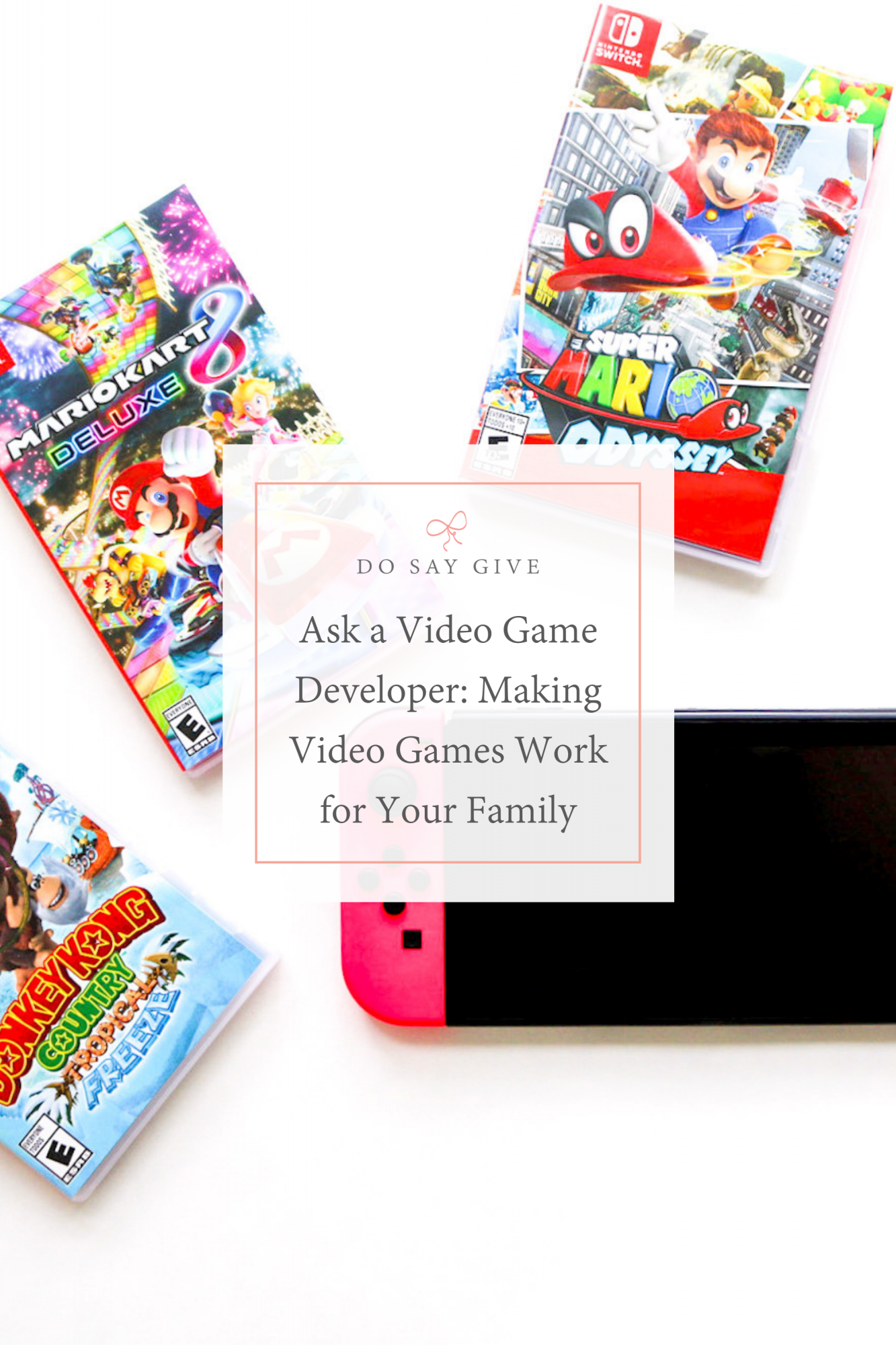I hope you have been enjoying our guest posts as much as I have while I am taking some time off. Since video games are a part of so many children’s lives these days I am so thankful for the insight in today’s guest post. Cole Thatcher is a video game developer and the husband of one of our team members (Meg!). He explains the different kind of video games, why you don’t have to be scared of all games, and some great tips for making video games work in your family.
Before we get to the Q&A with Cole, I want to highlight that this post is meant to be informative so you can make the best decisions on video games for your family. Every family is different, but this post is really geared toward parents of older children, tweens and teens. As a mom, my advice to parents of young children is to hold off as long as possible, both for sanity’s sake (I hate being “tech support”) and also because it’s very hard for traditional toys that spark imaginations to compete with the pull of an iPad or an XBox.
But there comes a time, especially when children near the tween years, that video games are popular and even a social vehicle in some boys’ circles (as Cole notes below). So if you are considering video games or want to learn more about the video games your child is playing, you will find this post very helpful and empowering!
Q: Why do you think video games are so important to our culture right now?
A: I am passionate about sharing how video games can be a positive influence in our lives and the lives of our kids, but with everything, they can be enjoyed more by everyone when there is communication between children and parents and set expectations about weekly play time. When parents are involved in children playing video games, you can ensure more protection and safety for your family and your child. I believe video games can bring friends and families together and help create incredible memories. They can teach kids problem solving and leadership skills as well as improve hand-eye coordination and reaction times. But, with all things, we must be careful and diligent in how we approach and use them.
Q: Can you share a little bit about the gaming industry?
A: The game industry has consistently been growing over the past few years. In 2019, the industry’s revenue grew to over $150 billion dollars which is well over twice the size of the movie industry. We are seeing an incredible increase in engagement in social media and the video gaming platform evolve as a social platform that is allowing people to connect globally.
Q: What makes video games so exciting to you?
A: I enjoy media that is interactive. With video games, I get to engage. In one game, I use problem solving to figure out how to solve a complex puzzle, in another I need to figure out the best strategy in a battle against other players. However the main reason I play games is the social aspect. Usually when I am playing games, I am talking with my friends over a voice app so we can strategize, figure things out or just chat about our lives. I have been able to stay in touch with my high school and college friends who are now all over the country by playing games with them.
Q: Why are children drawn to video games?
In my experience working with kids in our church youth group and working at summer camp, this is why games like Fortnite have become so popular. Kids are using video games as a social platform to connect with their peers. When I played outside with friends as a kid, most of the time was spent sitting around on the curb talking about things like school, sports and other hobbies. Now, those same conversations are being had while playing games like Fortnite.
A: How can parents be more involved in their child’s gaming?
I believe it is important that kids have this time, but that they do so in a safe, controlled and protected environment. I think the best way to do that is for parents to be educated on the types of games kids are playing and potential issues they should look out for. When understanding games and thinking about purchasing them for your child, it is important to look at payment models, game content, and how players are interacting with one another in game.
Q: Are video games worth the price?
A: One of the common payment models is boxed products where you pay for the entire game up front, usually $60, and you can play the entire game. Video games make great gifts for children, and when you consider the amount of game play that you get for the price, it is a great value. The average game has about 40 hours of main story line, but many games have hours more of game content that can be explored. When comparing that to a 2 hour trip to the movies, the value is incomparable.
Q: If someone already purchased the game, why are there more costs?
A: There are games that are free to play like Fortnite, Candy Crush or League of Legends. However, the games still need to make money and do so by charging for microtransactions. These are where players can pay to have small upgrades or cosmetic items. You may have experienced your child coming up to you and asking for a new skin in Fortnite that costs anywhere from $5-$20. Purchasing these skins make their character look like a Stormtrooper from Star Wars or a player from their favorite football team. These often become fashion statements and are like getting new shoes and wearing them to school.
Q: How do you know what payment model a game is?
A: When your child is interested in a new game, I would recommend doing a little research into what type of payment model the game is. It will help you know up front how much money could be spent on the game and what a player’s options are. In both free-to-play and battle pass I would recommend using parental controls to lock down your credit card. It’s incredibly easy to purchase these things in game (by design) and, whether intentional or not, it is possible to quickly spend hundreds or thousands of dollars on in game purchases. It is especially easy to do this on mobile games that require you to pay $0.99 to continue or wait 24 hours. Monitoring these games on the device they play on could save you a lot of money.
Q: How do you know if a game is appropriate for a child?
A: I can’t give a surefire answer for which games are appropriate for your kids or kids their age. Most major game titles will have an ESRB rating, similar to a movie rating, but I would encourage you to read the commentary that comes with the rating. Pay close attention to this because it will give you an idea of the content that is coming and whether or not it is something you want your children to be exposed to. I have included some of my favorite games for all ages below.
Q: What about violence in video games?
A: Discussions on video game content often lead to a discussion of violence in video games. There is a common stigma that video games cause violence and antisocial behavior. In kids’ formative years, it is important to be mindful of what they are exposed to and it is a question I often see people struggle with. Doing research into the game that your child is asking for can help you be more aware of what is coming into your home and will allow you to edit the content that your child consumes.
Q: Do all games have violence?
A:While many games exist that don’t focus on combat or violence, many of the popular titles do.I tend to rely heavily on the game’s rating here and generally feel that cartoon violence is okay. I started playing Super Smash Brothers (a fighting game with characters from the Mario universe rated E10+) when I was 4 or 5. This is up to your discretion but most games that are labeled with cartoon violence don’t show blood or gore. As games get more realistic, such as Players Unknown BattleGround (PUBG) or Call of Duty, they tend to add more blood, more realistic and graphic deaths and even dismemberment. These are games I would not recommend to children.
Q: Many parents are afraid of their child talking with strangers on video games. How can I prevent this?
A: Multiplayer games are the games that have a chat feature that would allow players a chance to play against and interact with other real players over the internet. These are my favorite kinds of games that allow me to stay in contact with my friends from college who live in Texas while we are in Washington. However, much like social media it does open up opportunities for misconduct, inappropriate language, cyber-bullying and other activities you may want to shield your kids from. Most online platforms (Xbox, Playstation, Nintendo Switch, and some on PC) have parental controls. These will allow you to block incoming untrusted friends and chat requests, block unwanted messages and other safety precautions. Using these tools can give you much more confidence in your kids time spent online and still allow them to play with their friends.
Q: Some parents feel like their children are playing video games nonstop. What would you recommend to address this?
A: There are many games, specifically multiplayer games that prevent you from leaving the game in the middle. One person leaving in the middle of the game can ruin the experience of everyone else playing. Forcing kids to stop playing in the middle of a game (especially if they are playing with their friends) is going to cause some frustration and can lead to their account being banned for a few days. To avoid this, I think it is best to set and communicate expectations. For example, you could set one time each week for them to play a multiplayer game where they will be in the game for up to an hour. Ultimately, setting the expectations for your child and the rules they must follow, will create a more enjoyable experience for them and less stress for you.
Video Games for the Whole Family
Video Games for Children Under 9
Video Games for Tweens (10-13)
Video Games for Teens (14-18)
Thank you, Cole! Knowing this wonderful insight about the gaming industry will be so empowering to parents as they navigate the world of video games. If you have any questions for Cole, ask below!
Cole Thatcher is a video game developer currently working as an Associate Producer on Halo Infinite. He graduated with honors from SMU Guildhall and was hired to work at Sledgehammer Games, known for Call of Duty: World War II. He is passionate about the video game community, specifically how gaming brings people together and fighting against the social stigma of video games. As a Christian in the video game industry, he is learning how to affect change and bring light to the industry while educating other believers on how to safely approach video games.






Lee, thank you for digging into this topic! I’m mother to an 11 yr old that loves video games. It’s been an education and,sometimes, a battle to navigate this topic. This post was gold! I appreciate your content and the care you put into making them meaningful and relevant to your followers. Cheers!
Oh I am so glad you enjoyed the post!! Thanks for the feedback!
Lee, Thank you for this post and the insights from Cole. I have a 10 year old boy and we are just venturing into the video game world and hearing others’ perspectives is so helpful. I appreciate you going there with this topic as a trusted source for all of us moms feeling a little in the dark.
I am so glad this was helpful! I will pass along to Cole, too!